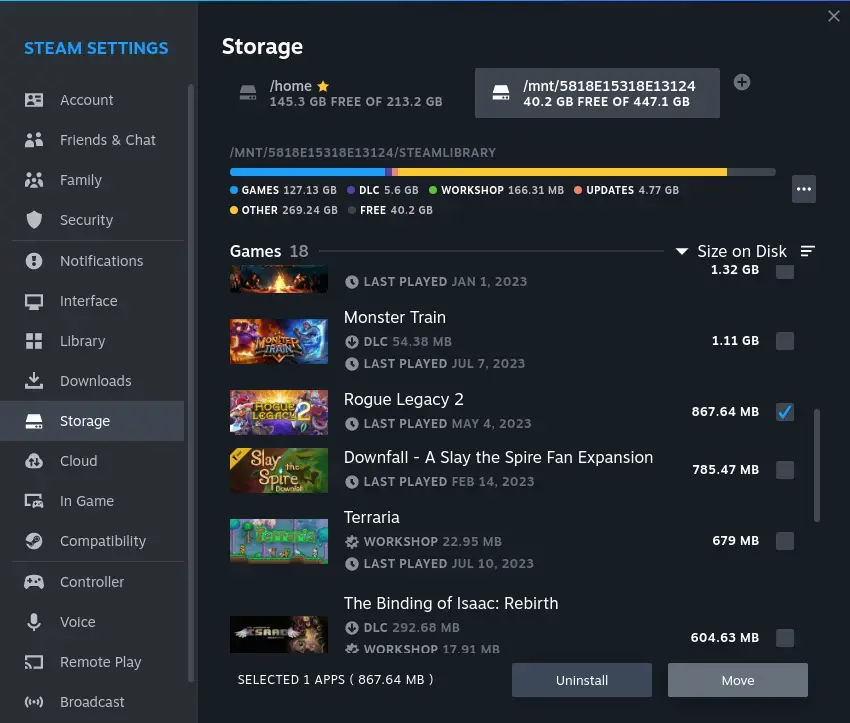- cross-posted to:
- linux_gaming
- cross-posted to:
- linux_gaming
Hi everyone, I just finished writing a guide on everything you need to know in order to game on Linux. It covers Proton (Steam play), using Heroic Launcher (with Wine-GE), and all sorts of tidbits and tips I wish people had told me earlier. I hope this can be useful to someone out there!
Archive link: https://web.archive.org/web/20230816141640/https://popcar.bearblog.dev/everything-linux-gaming/
A few years ago I would say gaming on Linux isn’t worth it.
This was me in 2021.
I ate my hat when SteamDeck came out.
I’m really excited for the future of Linux!
@Potatos_are_not_friends Two things happened that changed everything: Proton and the open-source AMD graphics stack.
Let’s not forget VKD3D and DXVK. Absolutely earthshattering impact
The NTFS warning is a little disingenuous. I wouldn’t recommend people go with it if they’re choosing Linux only obviously, but I’m going to say with years of personal testing about 99.9% of things work just fine using an NTFS drive. I think it’s been years since I had any kind of issue with game data that I attributed (and maybe falsely) at the time to the NTFS filesystem.
In steam you’ll need to symlink your compatdata folder to a linux filesystem, but that’s about it.
I switched to BTRFS and used a Windows plugin that allows it to read/write to it. It solved all my NTFS and EXFAT issues and works great.
I’ve tried this also. It works alright unless you write files in Windows, it will set the UID to the Windows SID. WHen you use a Steamlibrary and move back and forth, games that are updated in Windows can give you permission errors in LInux, etc.
It’s all workable and definitely an option, but WinBTRFS has a performance overhead, and the dualing permissions made it not a perfect solution.
Yeah I remember having permission issues that were easily fixed with chown but they were hard to notice. I haven’t booted to Windows in over a year now so I must’ve forgotten lol.
I’m pretty sure WinBTRFS’s readme has a section about properly setting up the user and group permission stuff. Essentially just providing the Windows UUID to Linux POSIX equivilant, which generally ends up fixing all the permission related problems. The only real caveat is it not working with SuperFetch, so files aren’t cached in memory and have to be loaded from disk with every read.
I don’t even symlink compatdata and haven’t run into any problems. The whole NTFS thing is wild :D
deleted by creator
I see that you dedicated a paragraph to NTFS. There are quite a lot of people saying there are problems with gaming on Linux using an NTFS drive but I’ve rarely (never?!) seen anyone actually having problems with it. I myself have been dual booting for years and some games are on an NTFS drive shared between Linux and windows for convenience and I never had any issues besides the fact I had to disable fast reboot in Windows.
I’ve heard a lot of varying experiences but for me personally I just couldn’t get it to work, and I tried most of the workarounds like disabling fast reboot. It worked for a while but every now and then I’d constantly have to reset permissions for the entire drive, and even then games would not run sometimes. If someone knows more about this I’d love some info on it, but in general most of the Linux community agrees that NTFS causes more trouble than it’s worth.
I used ntfs while ago and the driver included in kernel corrupted my drive :p It was also very annoying when almost every single boot windows was forcing sfc scan and linux had problems mounting with write permisions.
It’s been a while since I switched to btrfs but I do remember the permissions being an issue with NTFS. It was quite annoying because Steam wouldn’t trigger an error so it was hard to debug when the game never opened.
When I still had a ntfs drive some games would play fine off of it but some would barely run or fail to launch completely. ESO didn’t care about being on an ntfs partition and ran fine. I think it was Doom 2013 that didn’t like it for me.
Bookmarked for later. Right now my aging PC is Windows 10 but been seriously thinking going OpenSuse with my next build, since Proton is magic according to my Steam Deck.
Luckily, Steam has a convenient way of moving games to your Linux partition.
How do you do this? Thanks.
Whoops. I forgot to mention this. I’ll add a little section for it later…
Go to Steam settings --> Storage. There you can add your 2nd Steam folder and be able to move games back and forth. You can select many games and click “Move”.

This is a great post! Thanks for writing it up!
Def a bunch of things I didn’t know or was briefly familiar with.
Huh, I could manage this. I still think anything involving a command line is going to be too much for all but people who just like tech stuff.




